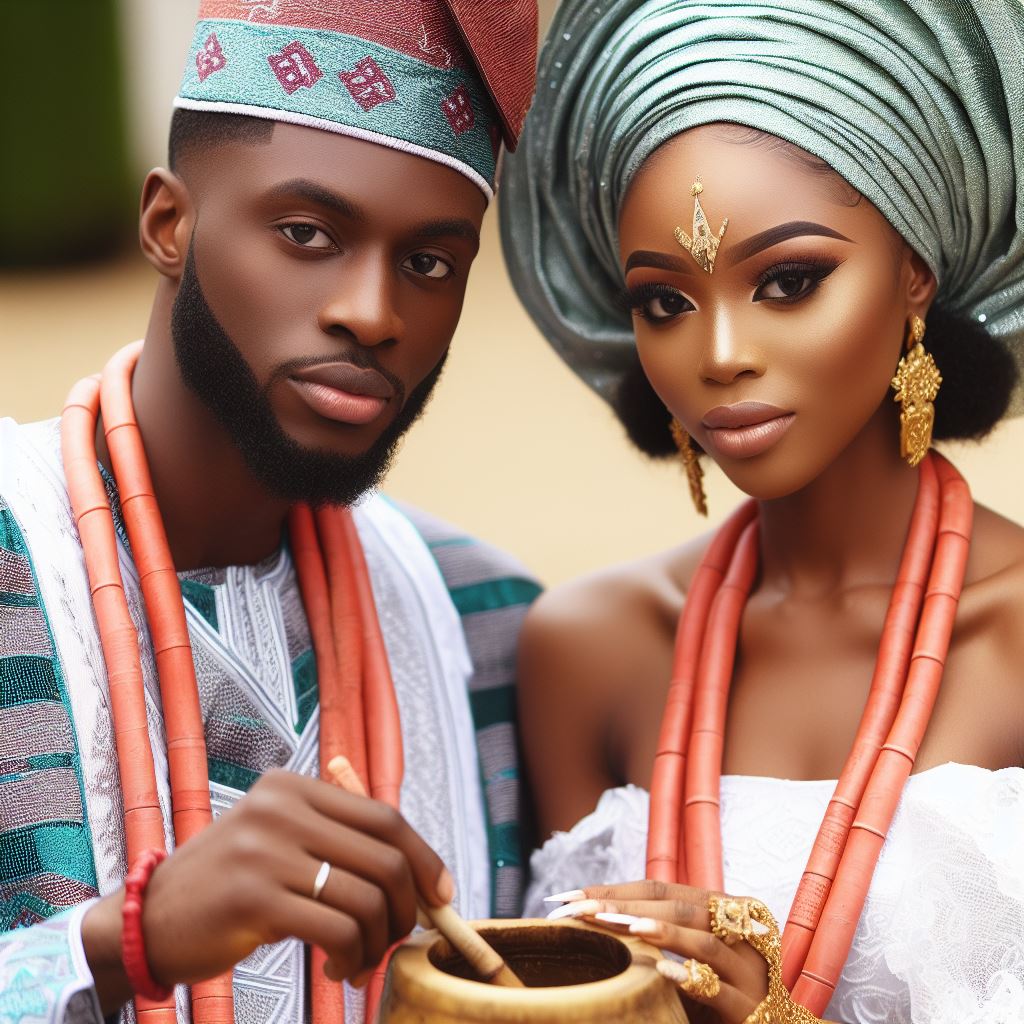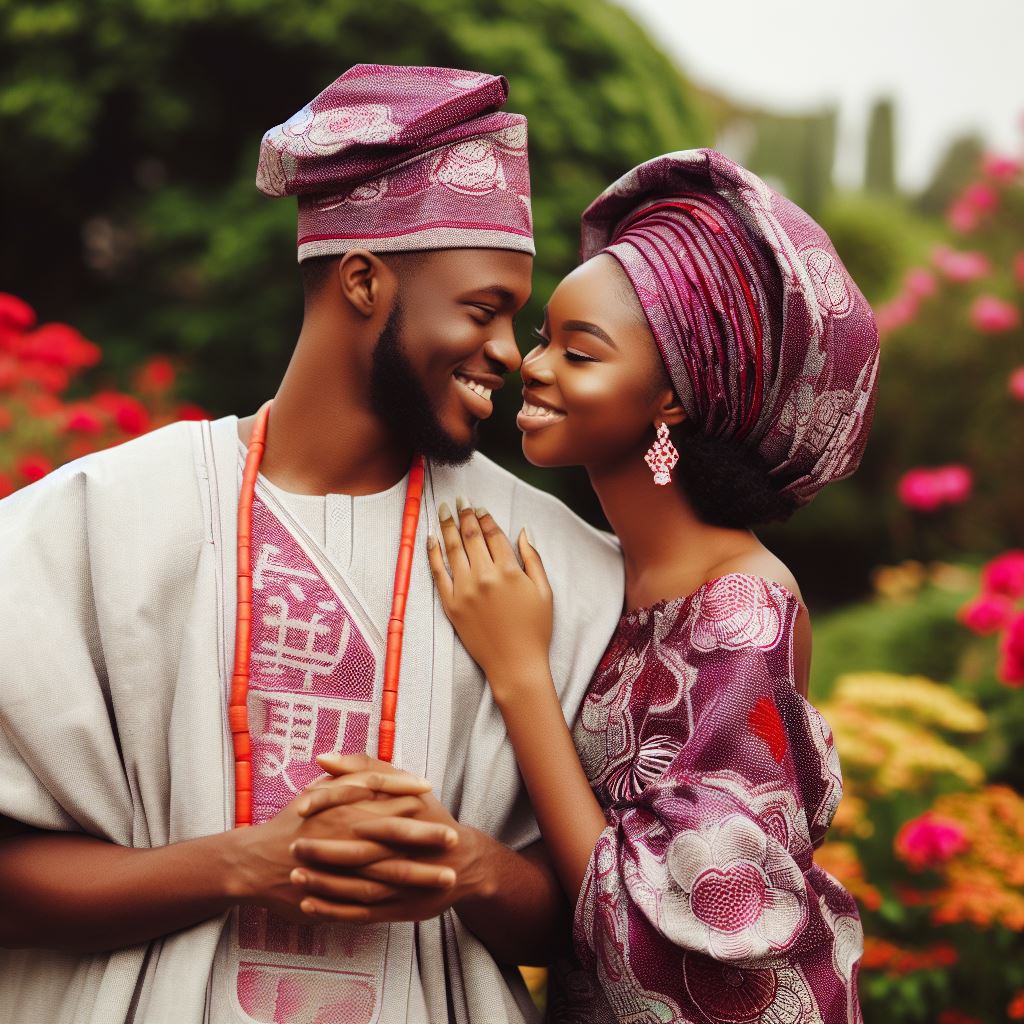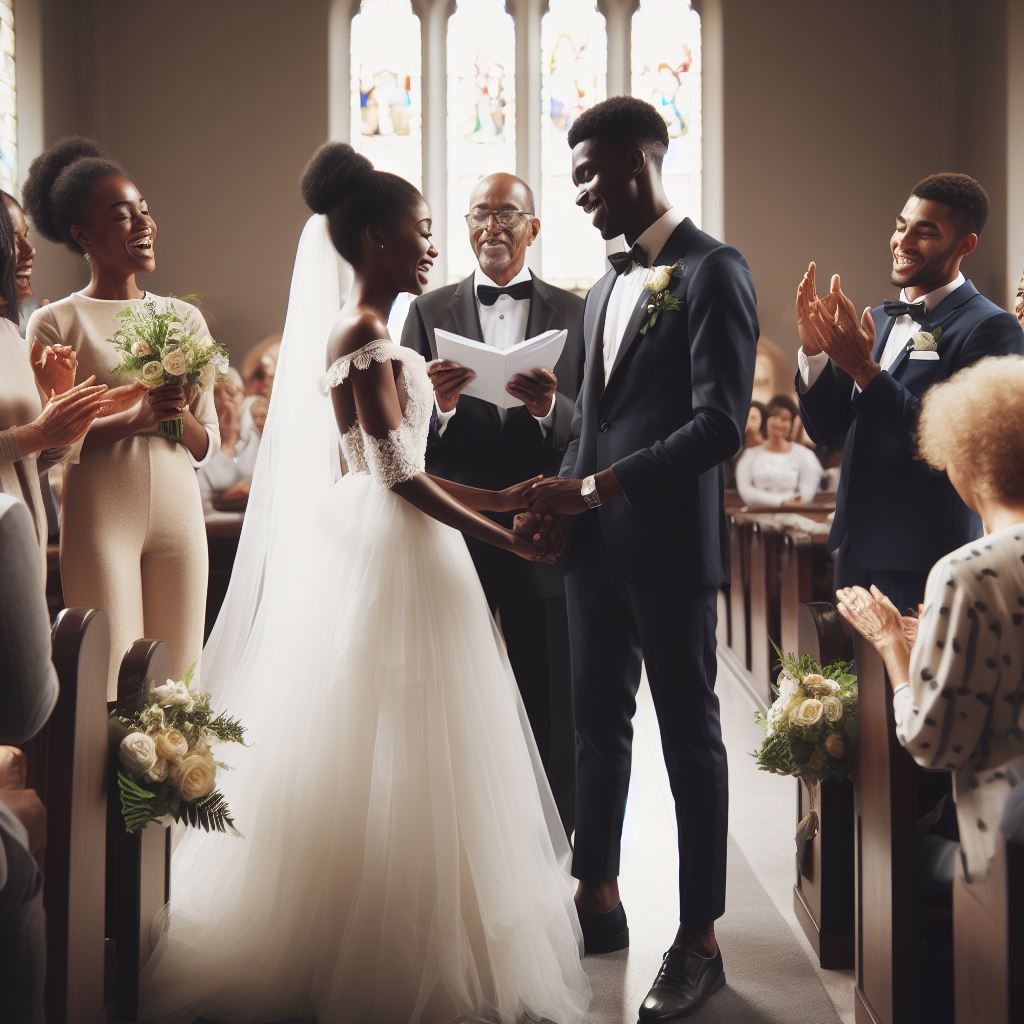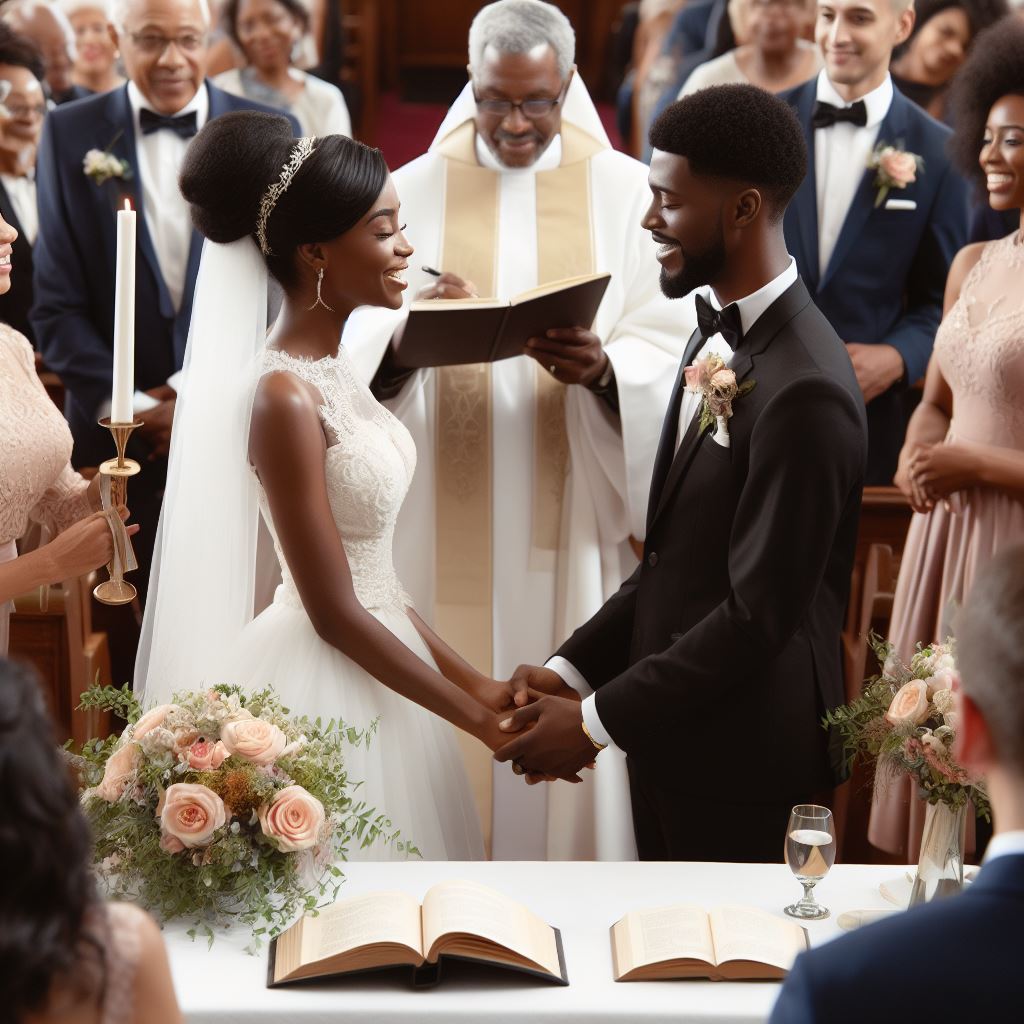Introduction
The Wedding Rites Rituals in Nigeria are an integral part of this significant institution, deeply embedded in the rich tapestry of culture and tradition.
Wedding rites and rituals hold immense importance in Nigerian society, representing the sacred union of two individuals.
This blog post aims to explore the rich meaning of marriage in Nigeria by examining the various rituals and rites associated with weddings.
Wedding Rites and Rituals in Nigerian Culture
Weddings in Nigeria are characterized by elaborate ceremonies, showcasing diverse cultural practices and customs.
These rituals serve as a means to connect the couple to their ancestors and bring blessings upon their union.
From the Igbo’s wine carrying ceremony to the Yoruba’s engagement ceremony, each ethnic group has unique traditions that symbolize love and commitment.
Purpose of the Blog Post
This blog post seeks to shed light on the deeper meaning behind Nigerian wedding rites and rituals.
By understanding the significance of these customs, readers will gain insight into the profound value placed on marriage in Nigerian culture.
Additionally, it aims to promote a greater appreciation for the preservation of these traditions amidst modernization.
Basically, wedding rites and rituals in Nigeria play a pivotal role in affirming the sanctity and meaning of marriage.
As Nigerian society evolves, it is crucial to recognize and preserve these customs that have been passed down through generations.
By celebrating and understanding the richness of Nigerian wedding traditions, we honor the deep cultural heritage that defines our society.
Traditional Wedding Rites
Traditional Wedding Rites in Nigeria
- Nigerian traditional wedding rites are deeply rooted in culture, reflecting the diverse ethnicities and customs across the nation.
- These ceremonies symbolize the union of two families, not just two individuals, emphasizing communal bonds.
- Each ethnic group has unique rites, but common elements include parental consent and blessings.
Importance and Symbolism of Each Ritual
- Kola Nut Ceremony: Breaking and sharing kola nuts signifies hospitality and goodwill.
- Wine Carrying: The groom carries wine, demonstrating his readiness to provide for the bride.
- Dowry Presentation: Presents, often livestock, represent the groom’s ability to support his new family.
- Tying the Knot: Literally tying a knot symbolizes the couple’s unity in marriage.
- Bride Price: Symbolizes the groom’s commitment to providing and caring for the bride.
- Prostration: Respect for elders and tradition is shown through this act.
- Igede Dance: The couple’s first dance together represents their union in joy.
Examples of Traditional Wedding Rites in Different Nigerian Tribes
Yoruba Tribe
- Introduction Ceremony: Elders negotiate and bless the union.
- Engagement Day: Exchange of gifts, including jewelry and clothing.
Igbo Tribe
- Iku aka Ceremony: Breaking of the kola nut and wine sharing.
- Igba Nkwu Ceremony: Traditional wine-carrying by the groom.
Hausa Tribe
- Kayan Zance: The groom presents gifts to the bride’s family.
- Fatiha: Islamic blessings and prayers for the couple.
Niger Delta Tribes
- Ekombi Dance: A vibrant dance during the wedding celebration.
- Igbadiong: The groom’s family seeks the bride’s consent.
Nigerian traditional wedding rites showcase the country’s rich culture and the significance of unity and tradition in marriage.
Read: Marriage Expectations: From Singlehood to Matrimony in Nigeria
Religious Wedding Rituals in Nigeria
Overview of Religious Wedding Rituals
In Nigeria, religious wedding rituals play a pivotal role in celebrating the sacred union of marriage.
These rituals vary across the diverse religious landscape of the country, with Christianity, Islam, and Traditional religions standing as prominent players.
Here’s an overview of each:
Christian Wedding Rituals
- Exchange of vows before a priest.
- The exchange of rings symbolizing eternal love.
- Prayers, hymns, and sermons to seek blessings.
- The ceremonial sharing of a communion meal.
- Traditional wedding attire in various ethnic styles.
Muslim Wedding Rituals
- The ‘Nikkah’ ceremony led by an Imam.
- Exchange of consent between the bride and groom.
- The ‘Mahr’ or dowry offered by the groom.
- Reading from the Quran and supplications.
- Breaking of the Kola nut, a sign of unity.
Traditional Religion Wedding Rituals
- Invocation of ancestral spirits and deities.
- Sacred dances, songs, and offerings.
- Rituals aligning with specific ethnic customs.
- Blessings sought from the spirits of the land.
- Elders’ involvement to ensure cultural authenticity.
Role of Religion in Nigerian Marriages
Religion in Nigeria is more than just a personal belief; it’s a cultural cornerstone.
Marriages are seen as divine contracts, and religious faith helps guide couples through the trials and joys of wedded life.
It instills values of love, respect, and fidelity, emphasizing unity under God’s watchful eye.
Significance of Religious Ceremonies
Religious wedding rituals strengthen the marriage bond, creating a sense of commitment and accountability to both the divine and the community.
They provide a foundation for shared values, offering couples spiritual guidance and support during the challenges of married life.
Through these ceremonies, couples not only celebrate their love but also build a solid foundation for a lifelong partnership, rooted in faith and tradition.
Read: The Dynamics of Christian Marriages in Contemporary Nigeria
Bridal Preparation Rituals
Pre-Wedding Rituals and Preparations for the Bride
- Kayan Zanu: Nigerian bridal preparation commences with the “Kayan Zanu,” a vibrant Henna night filled with song and dance.
- Bathing Ceremony: The bride is bathed in fragrant oils, cleansing her body and spirit for the new journey.
- Adornment: A rich display of gold and beads, like “Lalle,” adorns the bride, symbolizing her impending union.
Significance and Symbolism of Bridal Preparation Rituals
- Purity: The bathing ceremony represents purity, cleansing the bride from her past and preparing her for a fresh start.
- Joy and Family Unity: The Henna night fosters joy and unity, strengthening family bonds before the wedding day.
- Prosperity: Adornments symbolize prosperity, and the heavy jewelry represents the bride’s worth in her new family.
Traditional Practices and Modern Trends
Traditional Practices
- Wura Iyawo: “Wura Iyawo” is a custom where the bride’s family presents gold gifts to her.
- Tying of Wrappers: Wrappers symbolize the bride’s transition from girlhood to womanhood.
Modern Trends
- Pre-Wedding Photoshoots: Couples capture their love stories through pre-wedding photoshoots.
- Destination Weddings: Modern couples explore exotic destinations for unique wedding experiences.
In Nigeria, bridal preparation rituals transcend aesthetics.
They encapsulate tradition and symbolism, weaving past and present into a rich tapestry of love and unity.
Read: The Evolution of Marriage Definitions in Nigerian Cultures

Groom’s Preparation Rituals
Examination of Groom’s Role in Nigerian Wedding Rites
- The groom’s role in Nigerian weddings goes beyond a mere formality—it’s a sacred commitment.
- He represents strength, stability, and the bridge between two families, an emblem of unity.
Overview of Pre-Wedding Rituals and Preparations for the Groom
- The groom’s journey to marital bliss commences with pre-wedding rituals.
- Preparations involve a series of significant ceremonies and traditions, rich in cultural heritage.
Groom’s Pre-Wedding Checklist
- Obtaining parental blessings.
- Attending pre-wedding counseling.
- Selecting traditional attire.
- Preparing the dowry.
- Finalizing guest list.
Symbolism and Cultural Meaning Behind Groom’s Preparation Rituals
- Adorning the traditional attire signifies cultural preservation, a connection to his roots.
- The dowry symbolizes his willingness to shoulder family responsibilities, a testament to his commitment.
- The groom’s appearance reflects purity and readiness to embark on a new life journey.
- Selecting the “Aso-ebi” (family uniform) emphasizes solidarity and unity among the groom’s family.
- Sharing pre-wedding counseling emphasizes emotional readiness, creating a foundation for a strong and enduring union.
In Nigeria, the groom’s preparation rituals aren’t just a checklist; they are a reflection of the profound meaning marriage holds in the culture.
The groom’s role and preparations encompass tradition, symbolism, and unity, reinforcing the sacred bond of matrimony.
Read: Marriage Rites and Celebrations in Major Nigerian Tribes
Ceremonial Practices
The Wedding Ceremony Itself
The Nigerian wedding ceremony is a vibrant, lively celebration.
- It begins with a formal introduction of the bride and groom’s families.
- Elders, the heart of the community, play a pivotal role.
- The ceremony signifies not just a union but an intertwining of families.
- It’s a joyful event, often accompanied by traditional dances and songs.
- The couple’s attire is an essential aspect – rich, colorful, and symbolic.
Importance of Cultural Traditions
Cultural traditions are the very essence of Nigerian weddings.
- They preserve the cultural heritage of the diverse Nigerian communities.
- Each group has its unique customs, adding a rich tapestry of diversity.
- The rituals bind the couple in the eyes of both their families.
- Symbolic gestures, like the breaking of kola nuts, have deep significance.
- Traditional ceremonies help maintain a sense of identity and continuity.
Key Elements and Festivities
Nigerian weddings are a blend of modern and traditional elements.
- There’s a church or mosque wedding, often in Western attire.
- Traditional marriage ceremonies follow, with cultural regalia and customs.
- The lively feasts with sumptuous local dishes are unforgettable.
- Music and dance, especially the trendy Afrobeats, keep everyone grooving.
- Gifts and blessings are exchanged, sealing the couple’s union.
In Nigeria, weddings are more than just unions; they’re vibrant showcases of culture, tradition, and love.
Post-Wedding Rituals
After the vibrant Nigerian wedding ceremonies, a myriad of post-wedding rituals and customs take center stage, each playing a significant role in cementing the marital bond.
These customs, deeply rooted in tradition, vary across Nigeria’s diverse cultures, but their essence remains universally significant.
Customs and Rituals That Follow the Wedding Ceremony
- Igbo Tradition: The Igbo people, for instance, practice the “Ihu Ije,” where the bride is officially handed over to her groom’s family. Symbolically, the groom carries his bride across a threshold, signifying her transition into his family.
- Yoruba Tradition: Yoruba post-wedding customs include the “Alaga Iduro” and “Alaga Ijoko” roles, where a female and male elder, respectively, bless and counsel the newlyweds. It’s a moment of wisdom-sharing and guidance.
- Hausa Tradition: In the Hausa culture, the “Kayan Zance” ceremony is a pivotal post-wedding custom. It involves the presentation of gifts to the bride’s family as a gesture of goodwill and unity.
Role of These Post-Wedding Practices in Strengthening the Marital Bond
- Fostering Unity: These rituals bridge the gap between families, promoting unity and acceptance of the newlyweds.
- Guidance and Support: Elders’ wisdom imparts essential knowledge and offers support for the journey ahead.
- Solidifying Commitment: These customs symbolize the commitment to honor tradition, bringing couples closer and deepening their bond.
Examples of Post-Wedding Rituals in Different Nigerian Cultures
- Igala Culture: In Igala, the “Ojoni” custom involves the groom’s family visiting the bride’s family, reinforcing the connection between them.
- Ibibio Culture: Ibibio people perform the “Nkong Nkan Abasi” ceremony, where the couple seeks blessings from the gods for a fruitful marriage.
- Tiv Culture: The Tiv post-wedding ritual, “Tsav,” is a communal gathering that celebrates the union and strengthens community ties.
In essence, post-wedding rituals in Nigeria are not just traditions but profound expressions of love, unity, and a shared commitment to the journey of marriage.
These customs, enriched with symbolism, continue to play a pivotal role in shaping lasting and meaningful marriages across the nation.
Conclusion
The wedding rites and rituals in Nigeria hold immense significance in the celebration of marriage.
These traditions serve as a way to honor the rich cultural heritage and preserve the customs passed down through generations.
Preserving these traditions is crucial as they not only strengthen the bond between couples but also foster a sense of community and belonging within Nigerian society.
The rituals symbolize commitment, love, and unity, reminding individuals of the sacredness and solemnity of marriage.
It is important for Nigerians to continue practicing these rites and rituals, as they are a tangible expression of their values and beliefs.
By upholding these traditions, future generations can learn and appreciate the enduring meaning of marriage in Nigerian culture.
Ultimately, marriage in Nigerian culture is more than just a legal union; it is a sacred institution that encompasses spirituality, family, and community.
The wedding rites and rituals are a gateway to understanding the deeper meaning and purpose of marriage, and they serve as a testament to the enduring bonds that exist within Nigerian families.
As Nigeria continues to evolve and modernize, it is essential to hold onto these traditions as a way to maintain cultural identity and celebrate the uniqueness of Nigerian weddings.
By cherishing and respecting these customs, Nigerians can ensure that the true essence of marriage is preserved for generations to come.




